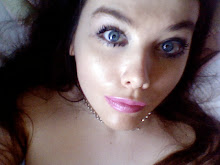Much like the gloaming, the dawn wears no mask. Its task is to erase the boundaries of night, into a conception of re-awakening. I woke to the dawn today. Sleep seems a bit inaccurate for me, la somnambule! I've been thinking about something, perhaps best conceptualized in my most recent poem, about the island of Cythera. Cohabiting love/beauty and death:
There is an island where Myrtle and Cypress
Feed each other golden threads.
Near where Leucas gave Sappho
To the surf, and the rocks,
Until her heart was dead.
But here, Sappho’s hair is golden,
Her lips a poppy red,
And the sky,
A face of blemishes,
Has its clouds cleared away,
And the grass grows dewy,
Under a gloaming tent,
And the moon launders its beams,
Over dawn,
And all the anemones bunched like stars
Wait for the feet that would crush them down.
I remember ages ago, when I first read Keats' Ode To A Nightingale, and I couldn't help but cry, thinking about his concepts of his own mortality. Perhaps because they co-mingled with mine. It's interesting, it seems to temper death, we create something immortal, against which our lives can be a vast relief. But being in relief has its disadvantages. Especially when doubt torments us, and we are left with what? Space and time. "The ineluctable modality of form." Even as we dream, feed on the dream of being on Lethe wards drunk, dreaming the immortal Nightingale's song, we only go wrong in attempting to pretend it all amounts to more than nothing. And I do not say this as a nihilist and whatnot, nothingness is beautiful. It's capable, culpable. And makes me realize all the more that even "source" is a mask for something more... infinite.
Is this heaven or is this hell?
She waits for a hand
Soft and white, to break the Myrtle and Cypress,
And fashion them into a crown,
Flowers of Lethe’s thorns.
I don't know why, but dawn seems more diaphanous to me than anything. Even more than the moon laundering its beams over an ocean's horizon. I suppose because in it I find something of a shape shifting Idol, and what are we if not makers and breakers of our own diaphanous Idols? The difference between Keats' Nightingale and my dawn is simple; whereas Keats can set himself in relief, really acting as the source for this creature, I'm the shadow to something endemic. And what could be more endemic than the cusp, the burgeoning of life from sleeping?
Maybe I'll play Stravinsky's Firebird. Just to remind me how in art, like life, everything is a matter of re-creation. An author, like any concept of divinity, is both a known and unknown force, upon which we set ourselves up, to be made, and, ineluctably... broken.
Subscribe to:
Post Comments (Atom)


This is lovely. Thank you. --E
ReplyDelete